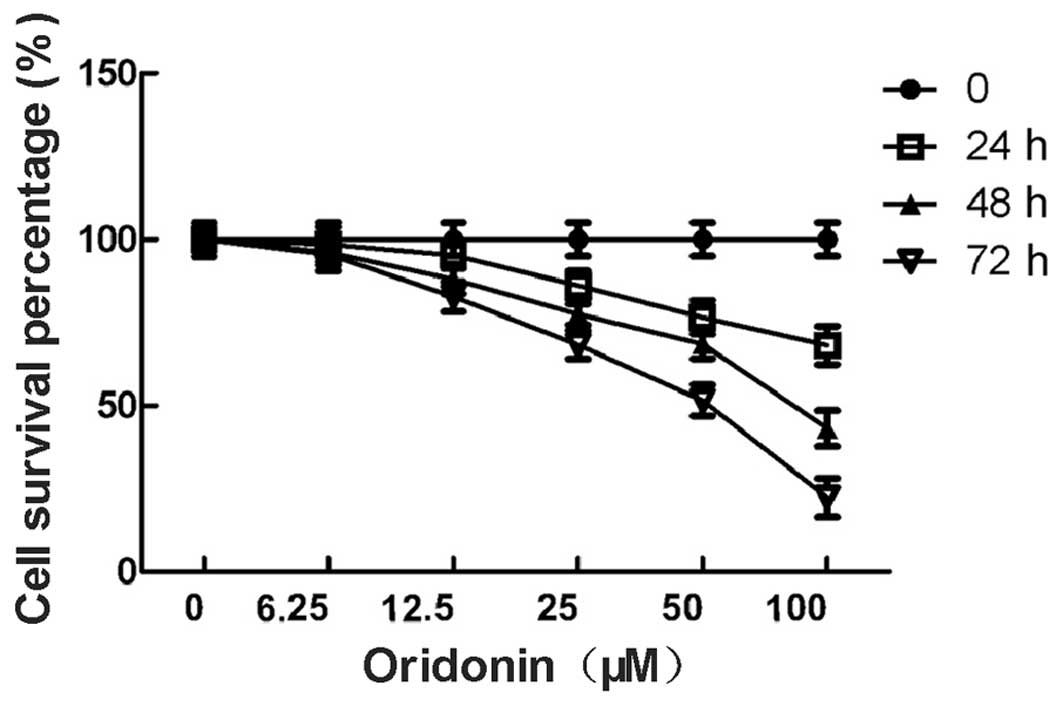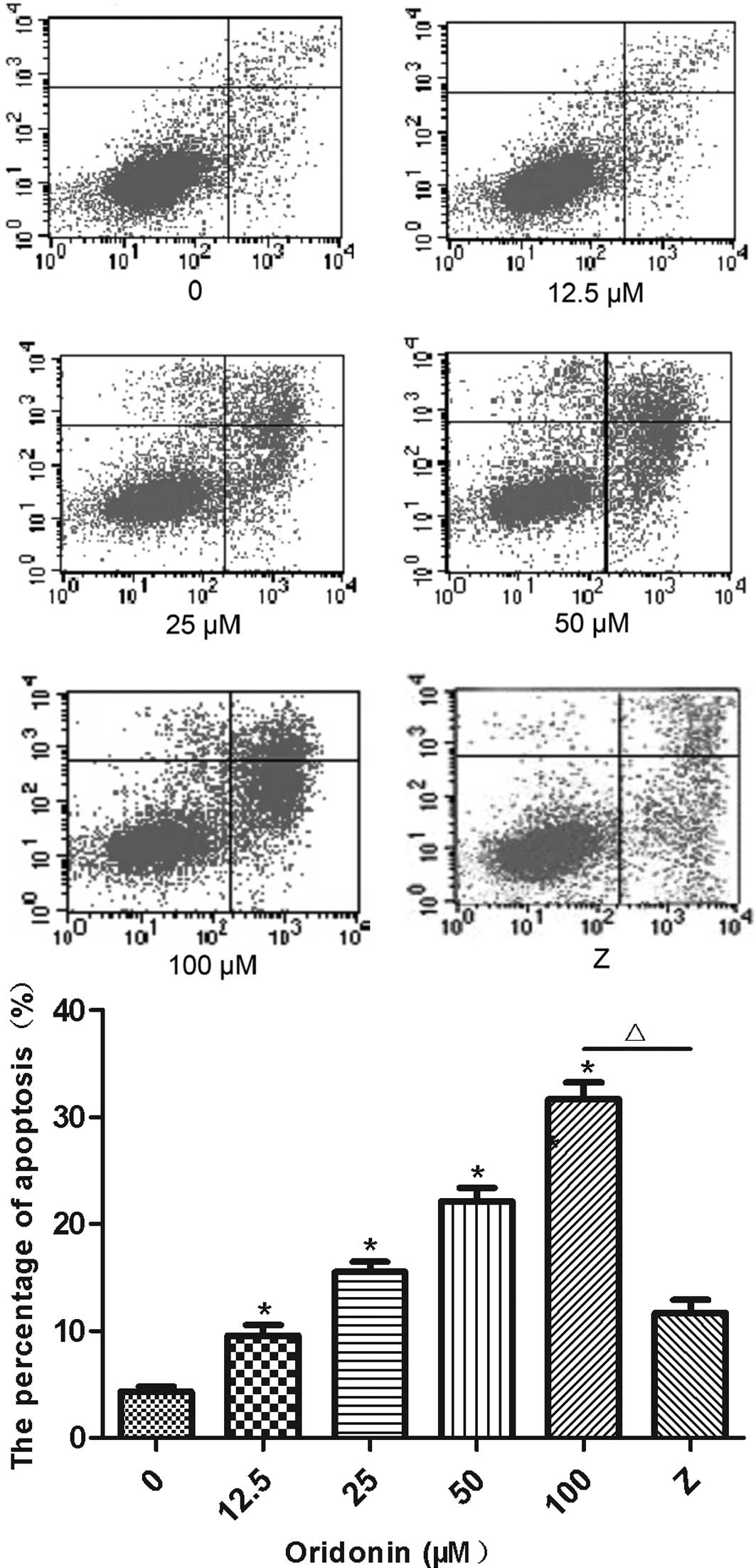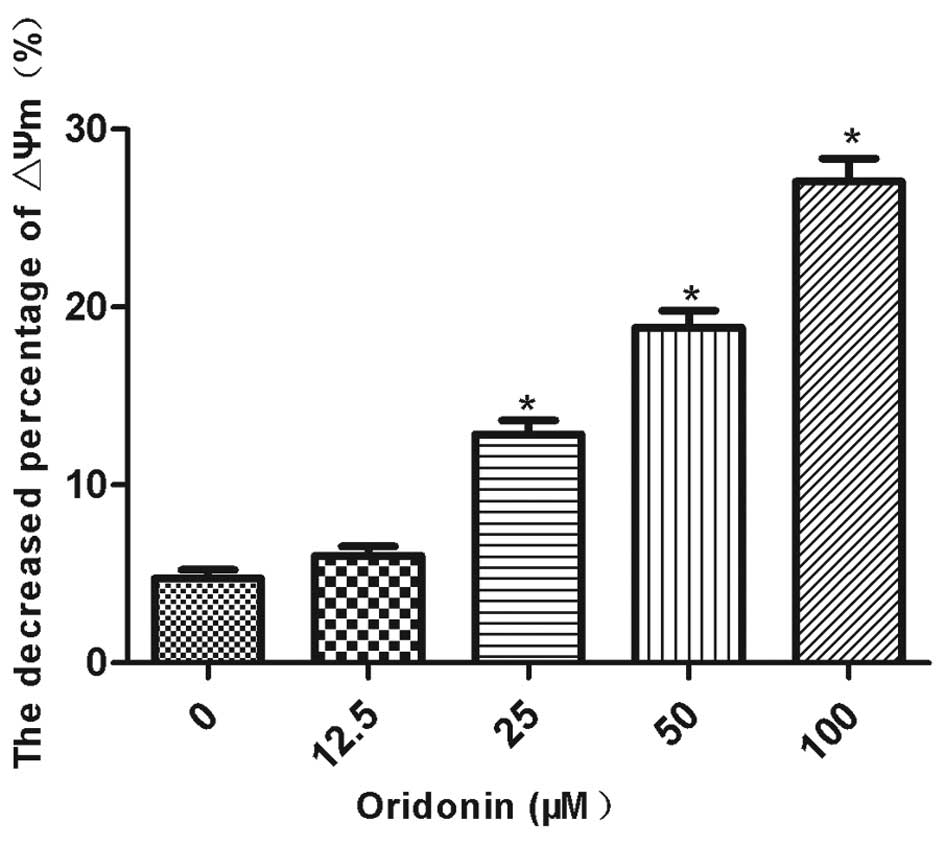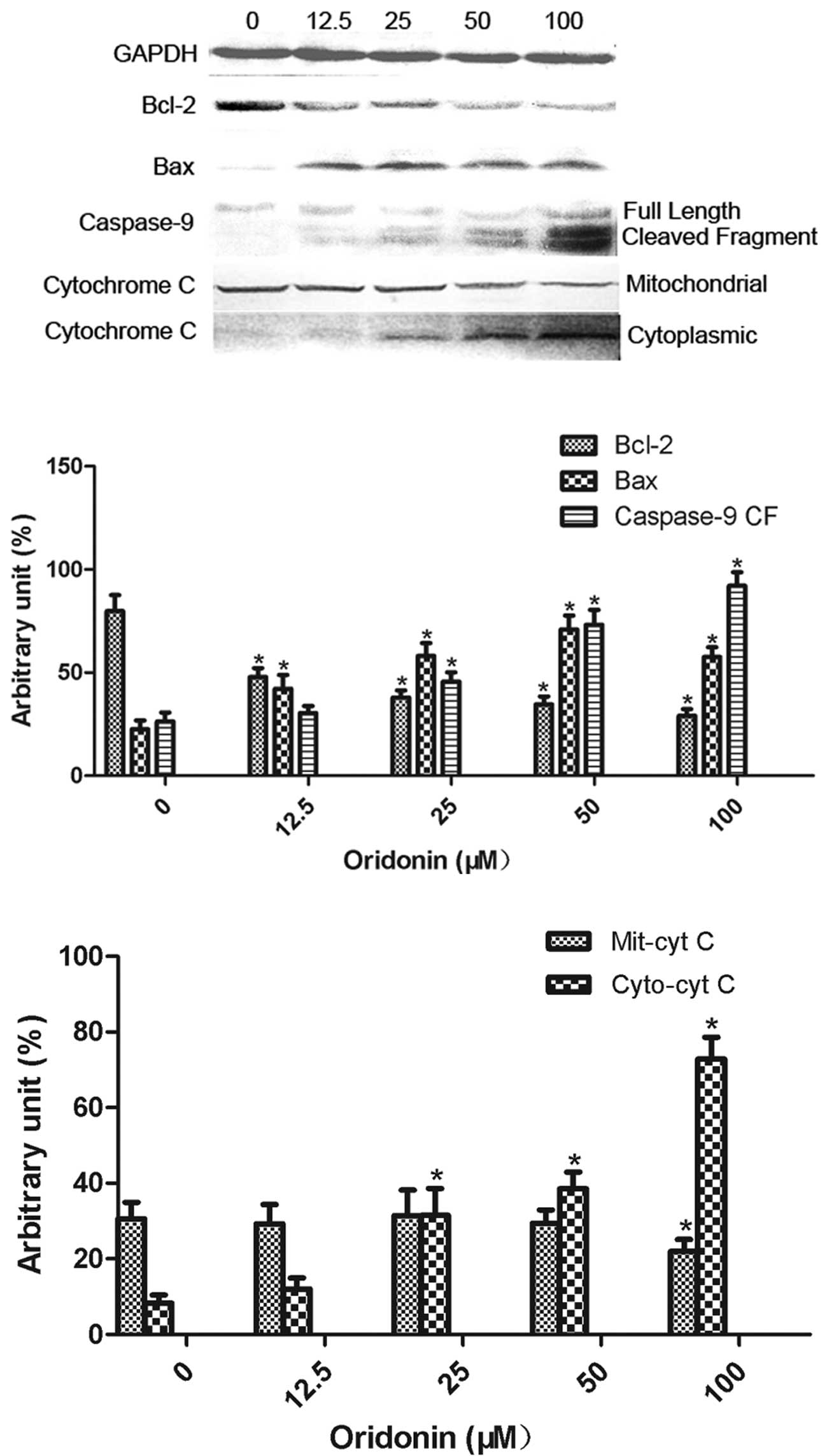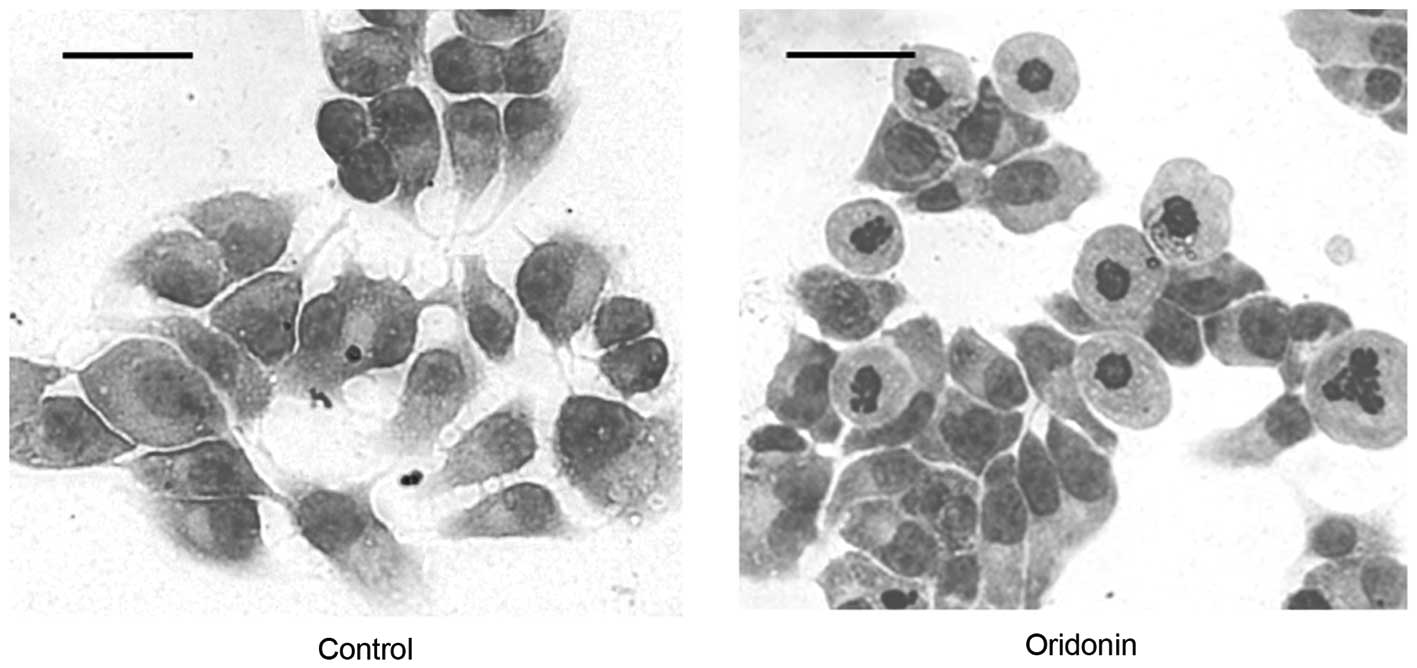|
1
|
Barazani Y, Hiatt JR, Tong MJ and Busuttil
RW: Chronic viral hepatitis and hepatocellular carcinoma. World J
Surg. 31:1243–1248. 2007. View Article : Google Scholar : PubMed/NCBI
|
|
2
|
Fancellu A, Rosman AS, Sanna V, Nigri GR,
Zorcolo L, Pisano M and Melis M: Meta-analysis of trials comparing
minimally-invasive and open liver resections for hepatocellular
carcinoma. J Surg Res. 171:e33–e45. 2011. View Article : Google Scholar : PubMed/NCBI
|
|
3
|
Bruix J and Sherman M: Management of
hepatocellular carcinoma: an update. Hepatology. 53:1020–1022.
2011. View Article : Google Scholar : PubMed/NCBI
|
|
4
|
Meade-Tollin LC, Wijeratne EM, Cooper D,
et al: Ponicidin and oridonin are responsible for the
antiangiogenic activity of Rabdosia rubescens, a constituent
of the herbal supplement PC SPES. J Nat Prod. 67:2–4. 2004.
View Article : Google Scholar : PubMed/NCBI
|
|
5
|
Sartippour MR, Seeram NP, Heber D, et al:
Rabdosia rubescens inhibits breast cancer growth and
angiogenesis. Int J Oncol. 26:121–127. 2005.
|
|
6
|
Hsieh TC, Wijeratne EK, Liang JY,
Gunatilaka AL and Wu JM: Differential control of growth, cell cycle
progression, and expression of NF-kappaB in human breast cancer
cells MCF-7, MCF-10A, and MDA-MB-231 byponicidin and oridonin,
diterpenoids from the chinese herb Rabdosia rubescens.
Biochem Biophys Res Commun. 337:224–231. 2005. View Article : Google Scholar : PubMed/NCBI
|
|
7
|
Liu YQ, Mu ZQ, You S, Tashiro S, Onodera S
and Ikejima T: Fas/FasL signaling allows extracelluar-signal
regulated kinase to regulate cytochrome c release in
oridonin-induced apoptotic U937 cells. Biol Pharm Bull.
29:1873–1879. 2006. View Article : Google Scholar
|
|
8
|
Li B, Zhu M, Wang C, et al: Oridonin
upregulates PTEN gene expression and induces apoptosis of HepG2
cells. Herald of Medicine. 9:62008.
|
|
9
|
Huang J, Wu L, Tashiro S, Onodera S and
Ikejima T: Reactive oxygen species mediate oridonin-induced HepG2
apoptosis through p53, MAPK, and mitochondrial signaling pathways.
J Pharmacol Sci. 107:370–379. 2008. View Article : Google Scholar : PubMed/NCBI
|
|
10
|
Xu Z, Zhou X, Lu H, et al: Comparative
glycoproteomics based on lectins affinity capture of N-linked
glycoproteins from human Chang liver cells and MHCC97-H cells.
Proteomics. 7:2358–2370. 2007. View Article : Google Scholar : PubMed/NCBI
|
|
11
|
Sun H and Liu GT: Inhibitory effect of
anti-hepatitis drug bicyclol on invasion of human hepatocellular
carcinoma MHCC97-H cells with high metastasis potential and its
relative mechanisms. J Asian Nat Prod Res. 11:576–583. 2009.
View Article : Google Scholar
|
|
12
|
Tian J, Tang Z and Ye S: Establishment of
a human hepatocellular carcinoma (HCC) cell line with high
metastatic potential (MHCC97) and its biological characteristics.
Zhonghua Zhong Liu Za Zhi. 20:405–407. 1998.(In Chinese).
|
|
13
|
Xiao SH, Xue J and Zhang HB: Further
studies on mefloquine and praziquantel alone or interaction of both
drugs against Schistosoma japonicum in vitro. Parasitol Res.
110:1239–1248. 2011. View Article : Google Scholar : PubMed/NCBI
|
|
14
|
Zhang Y, Hu MY, Wu WZ, Wang ZJ, Zhou K,
Zha XL and Liu KD: The membrane-cytoskeleton organizer ezrin is
necessary for hepatocellular carcinoma cell growth and
invasiveness. J Cancer Res Clin Oncol. 132:685–697. 2006.
View Article : Google Scholar : PubMed/NCBI
|
|
15
|
Salminen A, Ojala J and Kaarniranta K:
Apoptosis and aging: increased resistance to apoptosis enhances the
aging process. Cell Mol Life Sci. 68:1021–1031. 2011. View Article : Google Scholar : PubMed/NCBI
|
|
16
|
Brenner C, Subramaniam K, Pertuiset C and
Pervaiz S: Adenine nucleotide translocase family: four isoforms for
apoptosis modulation in cancer. Oncogene. 30:883–895. 2011.
View Article : Google Scholar : PubMed/NCBI
|
|
17
|
Dunkle A and He YW: Apoptosis and
autophagy in the regulation of T lymphocyte function. Immunol Res.
49:70–86. 2011. View Article : Google Scholar : PubMed/NCBI
|
|
18
|
Hellwig CT, Passante E and Rehm M: The
molecular machinery regulating apoptosis signal transduction and
its implication in human physiology and pathophysiologies. Curr Mol
Med. 11:31–47. 2011. View Article : Google Scholar : PubMed/NCBI
|
|
19
|
Sevrioukova IF: Apoptosis-inducing factor:
structure, function, and redox regulation. Antioxid Redox Signal.
14:2545–2579. 2011. View Article : Google Scholar : PubMed/NCBI
|
|
20
|
Sayeed I, Parvez S, Winkler-Stuck K, et
al: Patch clamp reveals powerful blockade of the mitochondrial
permeability transition pore by the D2-receptor agonist
pramipexole. FASEB J. 20:556–558. 2006.
|
|
21
|
Feng R, Han J, Ziegler J, Yang M and
Castranova V: Apaf-1 deficiency confers resistance to
ultraviolet-induced apoptosis in mouse embryonic fibroblasts by
disrupting reactive oxygen species amplification production and
mitochondrial pathway. Free Radic Biol Med. 52:889–897. 2012.
View Article : Google Scholar
|
|
22
|
Ola MS, Nawaz M and Ahsan H: Role of Bcl-2
family proteins and caspases in the regulation of apoptosis. Mol
Cell Biochem. 351:41–58. 2011. View Article : Google Scholar : PubMed/NCBI
|
|
23
|
Reed JC: Proapoptotic multidomain
Bcl-2/Bax-family proteins: mechanisms, physiological roles, and
therapeutic opportunities. Cell Death Differ. 13:1378–1386. 2006.
View Article : Google Scholar : PubMed/NCBI
|















